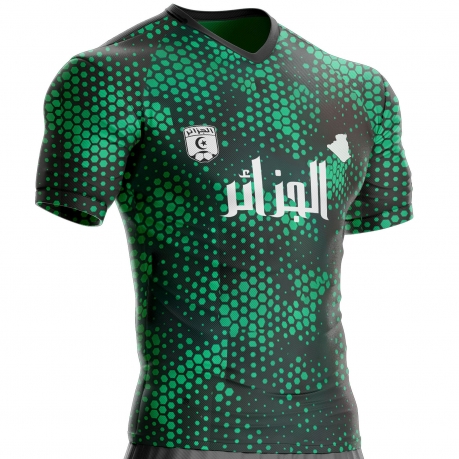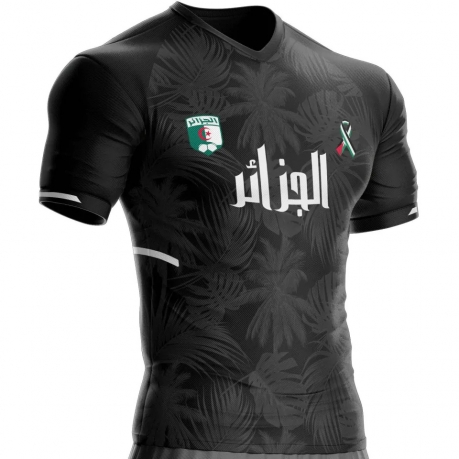Top 10 highest salaries of Algerian players

Algerian football: a world of stars and incredible salaries
In Algeria, football is much more than just a sport, it is a true passion that ignites hearts and animates discussions. Professional players, idols adored by the nation, fascinate with their talents and their exploits on the field. But one aspect of their lives is particularly intriguing: their salaries, often subject to speculation and fantasies. This article aims to lift the veil on this hot topic by exploring the remuneration of the highest paid Algerian players, based on reliable sources.
Talent and performance: keys to exceptional compensation
Several key elements influence the salary of an Algerian player. Performance is undoubtedly the main factor. The more a player excels on the field, the more his value on the market increases, attracting more attractive offers. The prestige of the employing club also plays a crucial role. A player playing in an internationally renowned European championship will have the chance to earn a higher salary than one playing in the national championship. The age and nationality of the player are also parameters to take into account.
Focus on the masters of the game and their astronomical remuneration
Who are the Algerian players who defy opposing defenses and club piggy banks? Let’s discover together some of these extraordinary talents:
Riyad Mahrez , the national team's essential playmaker, shines brightly in the colors of Manchester City.
Islam Slimani , the formidable striker, shakes the opposing nets for the Saudi club Al-Hilal.
Sofiane Feghouli , the experienced midfielder, distills his know-how within the Turkish club Galatasaray.
Aïssa Mandi , the imperial defender, reinforces the solidity of the defense of Villarreal CF in Spain.
Ismaël Bennacer , the young Algerian prodigy, treats AC Milan supporters in Italy.
Salary comparison and analysis: an enlightening perspective
Comparison is not right, they say. But to better understand the reality of the salaries of Algerian footballers, a comparison with their counterparts in North Africa is necessary. It is clear that Algerian stars playing in Europe generally rise to the top of the regional salary scale.
However, on the international scene, the gap is widening compared to European superstars whose remuneration reaches dizzying heights.
The impact of staggering salaries on Algerian football
The increase in salaries of Algerian players is not without effect on national football. This financial windfall makes it possible to attract and retain the best talents, thus contributing to the competitiveness of the national team and its influence on the international scene.
between dream and reality
In conclusion, the salaries of the most talented Algerian players have experienced rapid growth in recent years. Sporting excellence, the prestige of foreign clubs and the attractiveness of European championships contribute to this surge. If these incredible remunerations stimulate the development of Algerian football, they also invite a deeper reflection on the financial balance of the sector and the sustainability of this system.
The hidden cogs behind sky-high salaries
The player's performance level: a talent that can be bought
It's an immutable axiom of the world of football: the more a player performs, the more his value on the market soars. A string of spectacular goals, assists and high-level performances attracts the attention of prestigious clubs and arouses envy. Performance is therefore the key that opens the door to the highest salaries.
The employer club: a springboard to fortune
Belonging to a prestigious club plays a crucial role in a player's remuneration. Clubs playing in major European championships, such as the English Premier League or the Spanish La Liga, have substantial financial resources allowing them to offer huge salaries to their stars.
The championship: an international scene with unrivaled rewards
The level of competitiveness and the popularity of the championship in which a player plays also influence his salary. Top European leagues, with their global audiences and exorbitant broadcast rights, generate colossal revenues which are reflected in player salaries.
Age and nationality: parameters to take into account
Age is an important factor because mature players, at the peak of their careers, generally command the highest salaries. Nationality can also play a role, with some countries having more favorable tax policies for foreign players.
A complex cocktail for extraordinary remuneration
In conclusion, the salaries of Algerian players are not the result of chance. They result from a complex combination of factors such as individual performance, the prestige of the employing club, the attractiveness of the championship, the age and nationality of the player. It is by understanding the workings of this complex system that we can understand the financial reality of Algerian football today.
In the next part, we will explore the names of the Algerian players who dominate the salary landscape and analyze their remuneration in comparison with their counterparts in North Africa and Europe.
The masters of the game and their colossal fortunes
Riyad Mahrez, the undisputed king
The talented captain of the Algerian national team, Riyad Mahrez, reigns supreme on the podium of the highest paid players. His status as a global star, his exceptional performances with Manchester City and his undeniable aura have earned him an annual salary estimated at £45 million, placing him at the top of the African hierarchy.
Islam Slimani, the exiled pyrotechnician
The formidable striker Islam Slimani, currently playing for the Saudi club Al-Hilal, has become one of the highest paid Algerian players. His goalscoring talent and international experience allowed him to earn an annual salary of around 10 million euros.
Sofiane Feghouli, rewarded experience
Experienced midfielder Sofiane Feghouli, who shines under the colors of Galatasaray, takes advantage of his long career and his talent to pocket an annual salary estimated at 4 million euros. His leadership and vision of the game make him a valuable element for his club.
Aïssa Mandi, solidity at a golden price
Imperial defender Aïssa Mandi, pillar of Villarreal CF's defense, sees his talent rewarded with an annual salary of 3 million euros. His physical strength, his reading of the game and his consistency make him an essential player for his team.
Ismaël Bennacer, the young prodigy with flamboyant talent
The young prodigy Ismaël Bennacer, who delights AC Milan supporters, has established himself as one of the best midfielders in Europe. His precocious talent and immense potential earned him an annual salary of 3 million euros, an amount that is sure to rise over the years.
These five talented players are just the tip of the iceberg. Many other Algerian footballers playing in foreign and national clubs receive substantial salaries which contribute to their personal development and the prosperity of Algerian football.
In the next section, we will compare the salaries of Algerian players to those of their counterparts in North Africa and Europe to better understand the place of Algerian football in the international landscape.
Algerian football: between African ambitions and European challenges
Comparison with North African countries: financial domination
In North Africa, Algerian players playing in Europe are at the top of the salary rankings. The talent and consistency of Algerian players allow them to land more lucrative contracts than their North African counterparts.
Comparison with Europe: a gap to be filled
If Algerian stars are establishing themselves in North Africa, comparison with the salaries of leading European players reveals a significant gap. The superstars of European football receive astronomical remunerations which far exceed the financial capacities of Algerian clubs.
The impact of high salaries on Algerian football: a double edge
The increase in salaries of Algerian players has a positive impact on national football. It makes it possible to attract and retain the best talents, thus promoting the competitiveness of the national team and its international influence.
However, this financial windfall can also have negative effects. The attraction of high salaries can encourage certain players to favor less prestigious clubs for financial reasons, to the detriment of their sporting development. In addition, soaring salaries can create tensions within clubs and weaken their financial balance.
In conclusion, the salaries of Algerian players reflect the evolution of national football and its place in the international landscape. If the comparison with the countries of North Africa is flattering, the gap with European stars remains significant. The impact of high salaries on Algerian football is positive in many ways, but it is crucial to ensure that it does not become an obstacle to the sustainable development of the national sport.
The question of financial balance and the sustainability of this salary system remains a major concern for those involved in Algerian football.
Towards a promising future for Algerian football
In conclusion, it is indisputable that the salaries of the highest Algerian players have experienced significant growth in recent years. This increase is the result of a combination of factors, including the talent of the players, the attractiveness of foreign championships and the success of the Algerian national team, which has excelled on the international scene.
The impact of high salaries on Algerian football is generally positive. This makes it possible to attract and retain the best talents, improve the competitiveness of clubs and the national team, and contribute to the influence of Algerian football on an international scale.
However, it is important to emphasize that this evolution is not without challenges. The salary gap with European superstars remains significant and the question of the financial balance of Algerian clubs arises acutely. It is crucial to find a fair balance between promoting the talent of players and the sustainability of the national football system.
In conclusion, the future of Algerian football looks promising. The talent of the players, the support of the supporters and the growing investments in the sector suggest good prospects. It is important to continue to develop national football in a sustainable and responsible manner, ensuring both sporting performance and the financial health of clubs.
Algeria has the potential to become a key nation in African football and compete with the best European nations. The ball is now in the court of Algerian football players to seize this opportunity and write a new glorious chapter in the history of national football.









